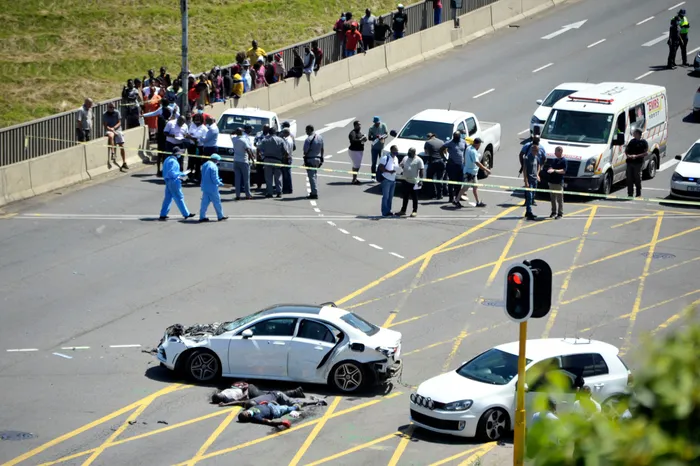Crime in South Africa can’t be solved solely through the criminal justice system

Picture: Theo Jeptha / African News Agency (ANA) - Police are scene at the active crime scene yesterday where 4 people were shot on the Higginson Highway in Durban.
By Zelna Jansen
Recent media reports on tavern murders have placed crime in the spotlight. Particularly, how it is resolved. It is known that South Africa is a very violent society with a high crime rate. A study conducted in 2007 by the Centre for the Study Violence and Reconciliation found that violent crime is deeply ingrained in the social fabric of South Africa and cannot simply be solved through the criminal justice system.
Factors that contribute to the high rates of violence is inequality, poverty, unemployment, marginalization, the vulnerability of young people, which is linked to poor child rearing, ambivalence towards the law, normalization of violence and an over-dependence on an inefficient criminal justice system.
There are many questions around the effectiveness of South Africa’s criminal justice system.
Particularly, as it plays a significant role in society. The criminal justice system at its core comprises of three main components. These are the South African Police Services (SAPS), the Judiciary and Correctional Services. Each of these branches must run properly to maintain law and order within a society.
SAPS must investigate and gather evidence that the prosecutor will need to present to a court before a magistrate or judge to obtain a conviction. The accused must then be incarcerated and rehabilitated. The current police to population ratio stand at 1:327. This is going to impact citizens severely. Wealthy and middle-class areas will employ security service providers. It is the poorest of the poor that will feel the lack of policing services worse. Police stations are also not properly resourced. This will impact the quality of evidence gathered for prosecution.
A good example is the case of the Senzo Meyiwa. Meyiwa was murdered in October 2014. At the time, it was believed to be a robbery gone wrong at the home of his girlfriend, Kelly Khumalo. It was reported that Senzo was shot whilst protecting Kelly from the attackers. The attackers fled the scene with Kelly’s cellphone.
A suspect was arrested but, released as there was no evidence connecting him to the crime.
There were several rumours of a cover-up by the people in the house. However, the case remained unsolved and became a cold up until 2019. Many were also critical of how the police investigated the case.
In 2020, authorities believed that Senzo was a victim of a hit and not as initially believed, a robbery gone wrong. Theories of a mastermind surfaced.
Muzikawukhulelwa S’tembu Sibiya, Bongani Sandiso Ntanzi, Mthobisi Prince Mncube, Mthokoziseni Ziphozonke Maphisa, and Fisokuhle Ntuli are on trial for Meyiwa’s murder.
Advocate Malesela Teffo represented accused numbers one to four.
Teffo withdrew as attorney representing the accused and sighted reasons that he was being harassed by the State and magistrate. Teffo had also on several occasions emphasized that there was interference by the Presidency and Minister Cele. The way the murder investigation was carried out seemed so far fetch and unfathomable that one may have been led to believe that there was political interference. But these allegations were never proved and now seems baseless.
The cleaning of the crime scene was probably the most damning act for the police investigation.
All the evidence that could have assisted in explaining what happened and linking potential suspects to the crime, was wiped away.
However, all is not lost. A picture of a gun with a caption “My killing machine” was found on the cell phone of accused number three, Mthobisi Carlos Ncube. He is alleging that he is imprisoned under life threatening conditions.
Prosecutor for the State, advocate Baloyi, alleged that this was the weapon used to murder of Meyiwa. advocate Baloyi will further lead evidence to prove that the cellphone of accused number three was confiscated upon his arrest. Data from accused number three’s cellphone was downloaded. It was here that the police found a picture of the firearm. This firearm was found on a kitchen cupboard and the bullet that killed Meyiwa matched this firearm.
This is an excellent piece of evidence and given that the crime scene was wiped clean, excellent police work.
One must question why Teffo withdrew from the case rather than bring an application requesting the magistrate to recuse himself? Continuing with the trial also provided him with an opportunity to proof the claims he made about interference. However, Teffo have been working on this case for some time. Such a high-profile case must have been extremely daunting. Frequent media interviews and having everyone commenting on everything you do, is enough to drive anyone to exhaustion.
The trial may be delayed for accused to find legal representation and bring them up to speed.
Criminal trials on average take a few years to be concluded. But though the wheels of justice turn slowly, may ever turn slowly, they are turning and hopefully the evidence led and interrogated, will tell the story of what happened.
Jansen is a Lawyer and CEO of Zelna Jansen Consultancy
This article is original to the The African. To republish, see terms and conditions.